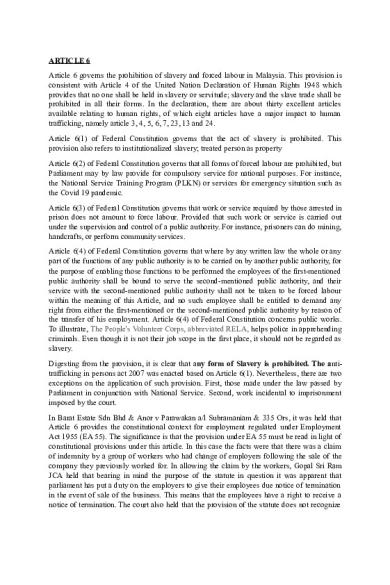Article 6 OF FEDERAL CONSTITUTION IN MALAYSIA Article 6 OF FEDERAL CONSTITUTION IN MALAYSIA PDF

| Title | Article 6 OF FEDERAL CONSTITUTION IN MALAYSIA Article 6 OF FEDERAL CONSTITUTION IN MALAYSIA |
|---|---|
| Author | Anonymous User |
| Course | Constitutional Law I |
| Institution | Multimedia University |
| Pages | 2 |
| File Size | 78.7 KB |
| File Type | |
| Total Downloads | 27 |
| Total Views | 162 |
Summary
ARTICLE 6Article 6 governs the prohibition of slavery and forced labour in Malaysia. This provision is consistent with Article 4 of the United Nation Declaration of Human Rights 1948 which provides that no one shall be held in slavery or servitude; slavery and the slave trade shall be prohibited in ...
Description
ARTICLE 6 Article 6 governs the prohibition of slavery and forced labour in Malaysia. This provision is consistent with Article 4 of the United Nation Declaration of Human Rights 1948 which provides that no one shall be held in slavery or servitude; slavery and the slave trade shall be prohibited in all their forms. In the declaration, there are about thirty excellent articles available relating to human rights, of which eight articles have a major impact to human trafficking, namely article 3, 4, 5, 6, 7, 23, 13 and 24. Article 6(1) of Federal Constitution governs that the act of slavery is prohibited. This provision also refers to institutionalized slavery; treated person as property Article 6(2) of Federal Constitution governs that all forms of forced labour are prohibited, but Parliament may by law provide for compulsory service for national purposes. For instance, the National Service Training Program (PLKN) or services for emergency situation such as the Covid 19 pandemic. Article 6(3) of Federal Constitution governs that work or service required by those arrested in prison does not amount to force labour. Provided that such work or service is carried out under the supervision and control of a public authority. For instance, prisoners can do mining, handcrafts, or perform community services. Article 6(4) of Federal Constitution governs that where by any written law the whole or any part of the functions of any public authority is to be carried on by another public authority, for the purpose of enabling those functions to be performed the employees of the first-mentioned public authority shall be bound to serve the second-mentioned public authority, and their service with the second-mentioned public authority shall not be taken to be forced labour within the meaning of this Article, and no such employee shall be entitled to demand any right from either the first-mentioned or the second-mentioned public authority by reason of the transfer of his employment. Article 6(4) of Federal Constitution concerns public works. To illustrate, The People's Volunteer Corps, abbreviated RELA, helps police in apprehending criminals. Even though it is not their job scope in the first place, it should not be regarded as slavery. Digesting from the provision, it is clear that any form of Slavery is prohibited. The antitrafficking in persons act 2007 was enacted based on Article 6(1). Nevertheless, there are two exceptions on the application of such provision. First, those made under the law passed by Parliament in conjunction with National Service. Second, work incidental to imprisonment imposed by the court. In Barat Estate Sdn Bhd & Anor v Parawakan a/l Subramaniam & 335 Ors, it was held that Article 6 provides the constitutional context for employment regulated under Employment Act 1955 (EA 55). The significance is that the provision under EA 55 must be read in light of constitutional provisions under this article. In this case the facts were that there was a claim of indemnity by a group of workers who had change of employers following the sale of the company they previously worked for. In allowing the claim by the workers, Gopal Sri Ram JCA held that bearing in mind the purpose of the statute in question it was apparent that parliament has put a duty on the employers to give their employees due notice of termination in the event of sale of the business. This means that the employees have a right to receive a notice of termination. The court also held that the provision of the statute does not recognize
automatic continuation of employment with the new owner of the business. The Constitutional Rights of the employee begins when the employee chooses his employer and no person may dictate on the choice. It is unconstitutional for employer to compel employee to continue employment as this would amount to force labour....
Similar Free PDFs

Article OF Faith 6
- 1 Pages
Popular Institutions
- Tinajero National High School - Annex
- Politeknik Caltex Riau
- Yokohama City University
- SGT University
- University of Al-Qadisiyah
- Divine Word College of Vigan
- Techniek College Rotterdam
- Universidade de Santiago
- Universiti Teknologi MARA Cawangan Johor Kampus Pasir Gudang
- Poltekkes Kemenkes Yogyakarta
- Baguio City National High School
- Colegio san marcos
- preparatoria uno
- Centro de Bachillerato Tecnológico Industrial y de Servicios No. 107
- Dalian Maritime University
- Quang Trung Secondary School
- Colegio Tecnológico en Informática
- Corporación Regional de Educación Superior
- Grupo CEDVA
- Dar Al Uloom University
- Centro de Estudios Preuniversitarios de la Universidad Nacional de Ingeniería
- 上智大学
- Aakash International School, Nuna Majara
- San Felipe Neri Catholic School
- Kang Chiao International School - New Taipei City
- Misamis Occidental National High School
- Institución Educativa Escuela Normal Juan Ladrilleros
- Kolehiyo ng Pantukan
- Batanes State College
- Instituto Continental
- Sekolah Menengah Kejuruan Kesehatan Kaltara (Tarakan)
- Colegio de La Inmaculada Concepcion - Cebu














